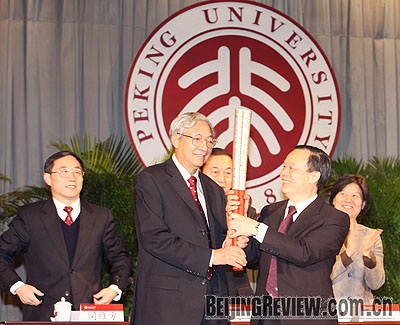|
|

HANDING ON: Former President of Peking University Xu Zhihong (left) passes an Olympic torch to his successor, Zhou Qifeng, at a handover ceremony on November 14, signifying a change of leadership (WANG TIANTIAN) |
The head of Peking University bid farewell to students there recently in an unusual fashion, walking through their dormitory singing the popular Chinese song Invisible Wings.
A video of the event, posted on the Internet, shows Xu Zhihong surrounded by students crying, "Thank you President Xu," and "We love you."
Three days after his musical farewell, on November 14, he officially handed his position over to a new president. His nine-year period in charge is regarded as some of the best years of Peking University.
As one of the most prestigious universities in the country, Peking University has played an important role in China's modern history since its establishment in 1898. It was the birthplace and base of the May Fourth Movement in 1919, a campaign to fight against feudalism and promote democracy and science. The May Fourth Spirit thus became the soul of the university.
At that time Cai Yuanpei, the best-known president of the university, was in charge. He hired talented professors with new ideas, which he allowed them to freely express. Under his stewardship the university became a paragon of free speech and gained its reputation as one of the best in China.
Xu is widely regarded as the second Cai, due to the reforms he brought to the university. He became the head in 1999, just after the university celebrated its 100th anniversary in 1998. "When I came here, I saw students still living in shabby dormitories, and the teaching buildings were all very old," Xu said. He remedied this situation by raising money for new buildings.
Xu also started the Yuanpei Plan, which allows students to choose their major in their second year of college and was followed by many other Chinese universities.
"Nothing is minus when it comes to Peking University," said Xu, who confessed to having sleepless nights due to the pressures of running the university.
Many of his decisions were controversial, such as his attitude toward postgraduate entrance exams, which he regards as useless. He has also been critical of the college entrance exam and is an advocate of more independence for universities in enrolling students.
"I never thought I would come back to be the president 40 years after my graduation here," said Xu, who was the first graduate to return as president. His successor, Zhou Qifeng, is also a graduate of the university.
Zhou entered Peking University to study chemistry in 1966. He received his bachelor's and master's degrees from the university before studying for a doctorate at M.I.T in the United States. In 1983, he returned from the United States to teach at Peking University, and in 1999 was selected as an academician at the China Academy of Sciences. Before taking over as president of Peking University, he had been the head of northeast China's Jilin University for four years.
During his four years at Jilin University, he conducted major reforms, including abolishing lifelong tenures for professors and solved crucial problems when Jilin incorporated five other universities.
"In spite of all the difficulties I had met at Jilin University, my four years here have been the happiest time in my life," said Zhou in his goodbye speech.
Students at Peking University have been discussing the new president's arrival on the university's online forum. "The reforms at Jilin University show Zhou is really a character. I am looking forward to this president," said a student with the web name "chocolate."
"I wonder whether the new president will sing popular songs like the old one did at our New Year parties," said Zhu Peilei, a sophomore at the School of Journalism and Communication.
Xu has remained at the university as a professor and now enjoys more free time to wander around campus chatting with students. He is confident about the future of his beloved university. "I believe Peking University will become even better, and the future is promising," he said.
| 